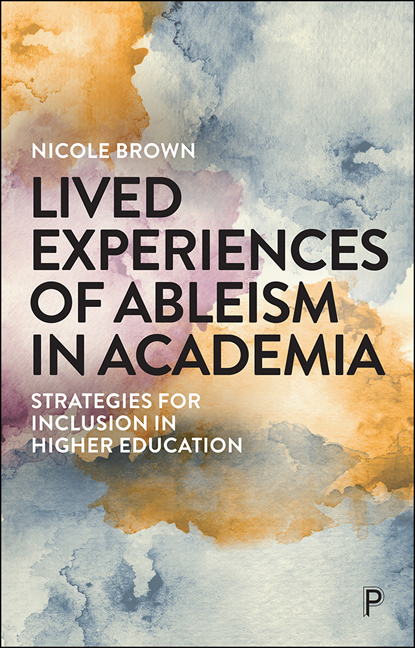11 - “I’m not saying this to be petty”: reflections on making disability visible while teaching
Published online by Cambridge University Press: 18 December 2021
Summary
Introduction
In this chapter, I reflect critically on my experiences of making my disability visible in teaching, through the process of asking students to engage in particular behaviours which improve the accessibility of my role as their lecturer. I use critical and feminist disability studies work to reflect on how this has been – and still is – a difficult, discomforting decision and process. I conclude with some reflective questions for disabled academics, and some recommendations.
This is personal
Before starting, I want to make clear that my experience, and my reflection, is rooted in my embodied identity as a White woman living with a chronic illness; other disabled people will have different experiences depending on their own embodied identities, and how others read and respond to those identities. My disability is broadly regarded as invisible, which is to say that I can pass as non-disabled to an observer who is not looking for signs of my particular disability or its impacts. But I experience chronic pain, fatigue and some brain fog. Brain fog is an experience of cognitive impairment that occurs with pain and/or fatigue, such as struggling to comprehend concepts or conversation that one might otherwise find easily manageable. My own brain fog tends to come with forgetfulness, and an inability to say certain words (noun aphasia), while others might experience slurred speech, or auras similar to that of migraine (see Chen, 2014 for a cripistemological reflection on brain fog). Sometimes I use a walking stick, but infrequently enough that when I do it is remarked upon by those who don't know me well. For this chapter, I am explicitly and deliberately not naming my diagnosis. This is in part because my diagnosis is not particularly useful when it comes to understanding the lived realities of my experience, especially as people with the same diagnosis as myself may have very different capacities and capabilities, and be impacted in different ways. This also reflects my deliberate decision to withhold naming my diagnosis from my students when asking for their cooperation in making my teaching spaces and approaches accessible to myself, choosing instead to identify to them as a disabled person. I want them, and you, as the reader, to focus on disability as a broad experience and socio-political identity, rather than the specifics of a medical diagnosis.
- Type
- Chapter
- Information
- Lived Experiences of Ableism in AcademiaStrategies for Inclusion in Higher Education, pp. 185 - 196Publisher: Bristol University PressPrint publication year: 2021



